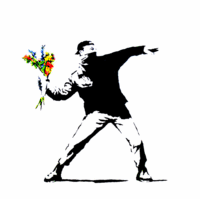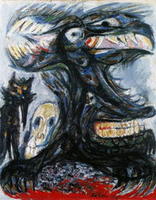One of the best things on music I've read in a long long while...
from
STYLUSSoulseekingPart of me has been wondering, for a while now, whether I simply don’t care anymore.
I should contextualise that. In autumn 2003 I got broadband. I also separated from my girlfriend (we’re very happily back together now, just so you know). Alone and lonely too, I started an accidental crusade (because I had nothing better to do, probably) to hear everything I possibly could. So I downloaded. I searched. I queued. I browsed the files of strangers. I looked for and tried to listen to everything any other writer at Stylus recommended. I hung around I Love Music far more than is healthy, making mental checks of every name, past and present, that seemed to have any degree of significance or interest attached to it. I was a music journalist, of a sort, and I needed to have an opinion, and that opinion needed to cover anything and everything, because otherwise… I tried to crowbar my mind as wide open as it would go, and then some, and cram everything in there. And I mean everything. Wire, grime, Cabaret Voltaire, Colleen, the Warp catalogue, Britney Spears, Timbaland, those old Can albums I hadn’t bought and couldn’t be bothered to pay for until they were remastered, Ludacris, Dave Douglas, Bubba Sparxxx (‘no, I need to download the American version because it’s more postmodern when he segues into “Cry Me A River”, don’t you understand?’), old dance tunes I remember from being a kid at the disco, rare stuff by groups like Orbital where I own every album and most of the singles anyway but needed that never-released remix of the Equinox theme, Disco Inferno’s EPs (just try finding them on eBay), The Zombies, 13th Floor Elevators, Mountain Goats, The Zephyrs, Jay-Z, Cannibal Ox, Madlib, Sugababes, Guns N Roses, Basement Jaxx, dozens and hundreds of others that I forget… (I even thought about downloading some Metallica, just to piss Lars off, but didn’t.)
[Of course this compulsive flurry of searching, queuing and acquiring led me to spend even more money on physical music than I had been doing before—being the audio snob that I am, anything I loved, or even just quite liked, I had to own properly assuming I could get it on CD (and remastered if it was more than about 12 years old). I researched copyright laws, never uploaded much music, and practised saying “for research and review purposes.” I still felt more of an attachment listening to an actual CD, or even MP3s ripped from a CD to an iPod, than streaming downloaded MP3s through my PC, just… because… there was an actual thing onto which I could focus attention, perhaps.]
I tried to get every album and individual song that I “wanted” at 160kbps if I could, as I reasoned that this was the optimum point between convenience and quality. MP3s at 160kbps work out at just over a megabyte a minute, generally. Inside a couple of weeks, maybe a month, I had a gigabyte. Two gigabytes. Ten gigabytes. Twenty by Christmas. A gigabyte is a thousand megabytes, right? Just over a megabyte a minute at 160kbps. Do the maths. Twenty gigabytes, that’s twenty thousand megabytes. Now let’s say that this makes fifteen thousand minutes of music. That’s 250 hours. Only I was lying when I said I had twenty gigs of the stuff. It was more like 40. That’s 500 hours. Ten hours a week for a year, with two weeks off for good behaviour. Consider that I also own a lot of CDs and records, work full-time, and play football a couple of times a week. And write occasionally. And do have some friends. And that, really, you need to listen to a song or an album several times in order to get a handle on it, to learn its contours, to appreciate it. Consider that, in some cases, you might really like something, and want to listen to it lots more anyway. 500 hours is a lot of music. Too much music. But I didn’t care.
Had I continued downloading music at the same rate as I did, or even at a half or a quarter of the rate, I would, simply, never have been able to physically catch up with listening to it all. I didn’t catch up with listening to it all. Even now there are albums on my hard drive, and dozens of songs on my iPod, that I have never listened to, and probably will never listen to. There is a small but steady stream of unsolicited promotional CDs through the letterbox, the vast majority unlistened to, and I feel almost the same way about them as I do the stockpile of unused, unloved, and arguably useless MP3s on my hard drive. How do I feel about them? A vague sense of disgust mixed with guilt.
I haven’t downloaded anything via P2P networks in over a year now. Apart from the fact that they keep crashing mid-download, apart from the fact that 9 year old girls are getting taken to court for downloading the theme tune to their favourite cartoon (unavailable in shops, kids!), apart from the fact that I realised my health was suffering, got back with my girlfriend, and didn’t have the time to spend three hours or more every night queuing and organising MP3s, apart from all of these reasons and more, I think I realised that what I was doing was a desperately, insanely futile pursuit. So why did I do it, aside from the boredom and the loneliness?
There is a compulsion to consume, and it’s getting worse. So eager are we to sample everything, quickly and in quantity, that we take no time to taste what it is that we’re consuming, never let our stomachs feel full or our palettes be sated. And so we stuff ourselves indiscriminately with everything we come across and end up bloated, sluggish, and tired. British supermarkets are full of aesthetically beautiful fruit that have the vitamins waxed out of them, prepared salads stored in plastic bags pumped full of preservative gases that cause the lettuce leaves to go brown and limp inside twelve hours once exposed to real air, “healthy” drinks for kids that contain more sugar than cola does, factory-farmed chickens that grow so fast their bones, when slaughtered, are soft and spongy and full of blood because they haven’t had time to develop properly. I’d draw comparisons with the music industry, but… More records were released in the first two years of this decade than in the whole of the 60s, if I recall correctly. I’m not massively keen on 60s music.
Anyone, almost, can release an album now. Recording equipment, a studio, is not a necessary to make a record—all you need is a computer, some software, half an idea and someone willing to publish your record. This super-democratic, punk-like ethos is wonderful in many ways, not least because it allows anyone to create, to express themselves. But it also allows almost unlimited amounts of unmitigated shite to be pumped into the already swollen arena of popular music and culture. Capitalism and the free market may give us the right to choose, but it waters down and obfuscates our options with reams of self-perpetuating, low-quality product. Who said cable TV was a good idea? 10,000 channels and there’s nothing on, or so it seems.
What drives the need to consume everything, why was I happy as a teenager to dismiss whole swathes of stuff that I now feel compelled to try and understand? There’s an inverted music snobbery which demands that I, the gifted, erudite and trained listener, can get things out of listening to Yes or The Crazy Frog that other, less erudite listeners simply pass over on point of principal, a relativism which decrees that everything has some value, no matter how base or hidden, and that, if you only listened the right way, you too would see what that value is. There is also the demand, a perception heightened and perhaps solely manufactured by the proliferation of easily-available music and music criticism on the internet, that we all be infinite dilettantes, that simply because we have the opportunity to sample everything at the click of a mouse that we necessarily should. But if you’re a dilettante then you are a dilettante.
dilettante
adj : showing frivolous or superficial interest; amateurish; "his dilettantish efforts at painting" [syn: dilettantish, dilettanteish, sciolistic] n : an amateur who engages in an activity without serious intentions and who pretends to have knowledge [syn: dabbler, sciolist]
Not that this is necessarily a bad thing, but how satisfying can it be to know nothing about everything, to value vague, instant opinions over deep understandings and appreciations, to have heard a hundred records but to have loved none of them? When I was 11 I would listen constantly to Misplaced Childhood by Marillion and I adored it, when I was 15 it was The Stone Roses, when I was 20 it was XTRMNTR; at 24 I listened to more records than I either care to or am able to remember, and I recall barely anything of any of them. When I had a dozen CDs I loved them all and that was enough until the next one arrived. When I had a thousand… I wanted more. I am now 26 and I have had enough. Almost.
Part of it, I’m sure, comes down to wanting to recapture that moment when I first listened to In Sides or Paul’s Boutique and sat with my eyes and mouth wide open in surprise, or that time when I dozed off during “Don’t Stop” and woke up during “I Am The Resurrection” and felt in another place, or when I first heard “Retread” or “Eye Know” or when I danced to “That Lady” in Brixton at 1am, but how did trying to recapture a moment of magic end up as such a greedy, frenetic hunter-gatherer rush to acquire? Why did I end up wanting to have listened to things rather than actually be listening to them? It’s not even like I relate favourite songs back to events in my life when they were significant, because I’ve never used music as an emotional battery like that; I’ve always loved it in and of itself primarily, a song or an album as a beautiful thing on its own that is perfect and that I can love and immerse myself in or use to paint my daily life with colour. It’s about the point of contact. I’ve said that before, I’m sure. I don’t want to know everything about 50s rock n roll or the key movers in postpunk, I can’t relate to grime when I live with the moors behind me and the sea in front, I don’t want to write articles on Miami bass or crunk or nu-folk or whatever the hell is being revived or invented this week. As nice as it would be, the practicalities of owning and knowing intimately, as LCD Soundsystem put it, every good record, ever, make it a ridiculous ambition
I wonder if perhaps it started with Astral Weeks, a record I stumbled across mention of in a bookshop while reading about The Verve in The Rough Guide To Rock or something similar as a 16 year old, and which, on further reading, I felt compelled to own, to understand, to consume and to have an opinion on. I bought it shortly afterwards, maybe even the same day, and listened to it. Ten years on I have maybe listened to Van Morrison’s opus a dozen times, probably less, and I have never fallen in love with it or felt it deeply move me. Is this because it’s a bad record? Because I’m a bad listener? It’s a critic’s job to find clever ways of explaining, in absolute, pseudo-objective terms, why he or she doesn’t like something, to say and then to prove that something is bad, rather than admit that they simply don’t like it. But to not explain is to sell your readers, and yourself, short, so explain one must.
Of course if you listen to anything enough times then its contours become ingrained in your mind, but is being able to predict a song’s twists and turns the same as enjoying them? I listened to jazz repeatedly and read criticism about it until I knew how to listen, what to listen for, until I started to enjoy it, although I am far from knowledgeable about it. Given time and inclination you can make yourself “enjoy” almost anything, perhaps. Whether there is any point or not is the question.
I’ve been worried that I may have overdosed on music over the last couple of years, that my capacity for being overwhelmed by music, for being astounded and for falling in love with it, had been replaced by quiet appreciation, admiration, and understanding. I don’t want to understand music and what it does to me, in many ways. Skim back up to where I mention listening to those Orbital and Beastie Boys albums for the first time—the joy then was about surprise, not predictability. You can play spot-the-influence or posit-the-theory as much as you like but that’s not why you would listen to one song over and over and over again as a fifteen year old. I fell in love with music in my teens but by my mid-20s we were on the verge of being estranged. How to go about getting that surprise back, getting that love back, is the question that’s most pressingly on my mind now. I’m not the only one.
Soulseeking will, with luck, be a regular column on Stylus from now on, written often by myself but also contributed to by the rest of the staff here, and, who knows, maybe some guest writers too. The nature of the column? To do a bit of what the title suggests, only within ourselves rather than the endless reaches of cyberspace, in order to better understand what it is we fell in love with, and, if needs be, go a little way towards getting that feeling back.
By: Nick Southall
2005-09-19






